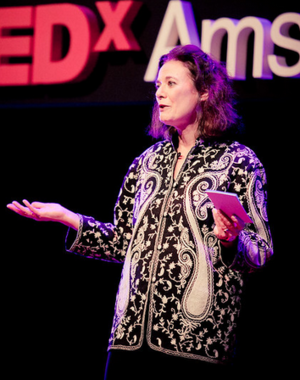Louise Fresco
(scientist, director) | |||||||||||||||||||||||
|---|---|---|---|---|---|---|---|---|---|---|---|---|---|---|---|---|---|---|---|---|---|---|---|
 | |||||||||||||||||||||||
| Born | 11 February 1952) Meppel, Netherlands | ||||||||||||||||||||||
| Nationality | Dutch | ||||||||||||||||||||||
| Alma mater | Wageningen University | ||||||||||||||||||||||
| Member of | Dutch Round Table, Rabobank, Trilateral Commission, WHO/Pan-European Commission on Health and Sustainable Development | ||||||||||||||||||||||
| Interests | • One Health • food • Big Ag • Big Food • Unilever | ||||||||||||||||||||||
Dutch food scientist who sat on the board of Unilever when she attended the 2015 Bilderberg meeting. In 2020, appointed to World Health Organization Commission that called for a Pandemic Treaty and a One Health strategy to take control over human, animal and environmental health.
| |||||||||||||||||||||||
Louise O. Fresco is a Dutch scientist, manager and writer. She has worked at the Food and Agriculture Organization and had several university posts in the Netherlands, working and writing on food, while at the same time having board positions in large Big Food corporations.
She is a member of the Trilateral Commission and the Dutch Round Table. She is a non-executive director at Unilever[1], and attended the 2015 Bilderberg meeting.
In 2020, Fresco was appointed by the World Health Organization’s Regional Office for Europe to be a member of the Pan-European Commission on Health and Sustainable Development, chaired by fellow Bilderberger Mario Monti.[2] The task was to "to rethink policy priorities in the light of pandemics",[3] and it called for an implementation of a One Health strategy to take control over human, animal and environmental health in a coordinated way, public-private partnerships, the creation of a Global Health Board under the G20, a Pandemic Treaty for joint decision-making, and a global pandemic vaccine policy.[4]
Contents
Food and Agriculture Organization
From 1996 to 2006, she was Director of Research and Assistant Director General for Agriculture at the Food and Agriculture Organization of the United Nations.[5]
There she was responsible, among other things, for shaping the policy on sustainable agriculture, the Commission on Sustainable Development and follow-up of Agenda21 as well the environmental treaties such as CBD (biodiversity), UNFCCC (climate).[1]
In 2000, she was promoted to Assistant Director-General, Agriculture Department (FAO). More than six years she led the department, which covers the technical backstopping of the majority of FAO’s field projects as well as technical policy in the area of food and agriculture, where she increased collaboration with the private sector and NGOs.. She developed extensive cooperation with IAEA, WHO, World Bank UNEP and other UN agencies.[1]
Genetically modified crops
Fresco wrote an article in Science journal attacking the EU's approval system for genetically modified (GM) crops on the grounds that it is too slow and unnecessarily precautionary. She claimed, "Europe's lack of trust in GMOs reflects a wider distrust of science. Similar attitudes prevail concerning shale gas and nuclear power."[6]
Undisclosed in her article was the fact that Fresco was appointed a Non-Executive Director of the multinational consumer goods company Unilever in May 2009.[7] Unilever has interests in industrial and food biotechnology.[8]
Corporate boards
Fresco is supervisory director of the Dutch bank, Rabobank.[9]
As of April 2019 she is Independent Non-Executive Director of the Board of Directors of Syngenta, with special attention for scientific innovations "for the purpose of healthy, sustainable food production."
Since 2007, she has been a member of the Social and Economic Council of the Netherlands (SER) (appointed by the Crown), the highest advisory body on government policy in the Netherlands[1].
Books
Her 2012 book Hamburgers in Paradise tries to "how science has enabled us to overcome past scarcities, and why we have every reason to be optimistic about the future. Using hamburgers in the Garden of Eden as a metaphor for the confusion surrounding food today, she looks at everything from the dominance of supermarkets and the decrease of biodiversity to organic foods and GMOs. She casts doubt on many popular claims about sustainability, and takes issue with naïve rejections of globalization and the idealization of "true and honest" food."[10]
Event Participated in
| Event | Start | End | Location(s) | Description |
|---|---|---|---|---|
| Bilderberg/2015 | 11 June 2015 | 14 June 2015 | Austria Telfs-Buchen | The 63rd meeting, 128 Bilderbergers met in Austria |
References
- ↑ a b c d http://www.louiseofresco.com/pdf/UK_Biography/cv_long_Louise-O-Fresco.pdf
- ↑ https://www.euro.who.int/en/media-centre/sections/press-releases/2020/announcing-the-pan-european-commission-on-health-and-sustainable-development-rethinking-policy-priorities-in-the-light-of-pandemics
- ↑ https://www.who.int/europe/groups/pan-european-commission-on-health-and-sustainable-development
- ↑ https://www.who.int/europe/news/item/10-09-2021-statement-a-bold-new-strategy-for-health-and-sustainable-development-in-the-light-of-pandemics
- ↑ Louise O. Fresco (2013) The GMO Stalemate in Europe, Science, 22 February 2013: Vol. 339 no. 6122 p. 883. DOI: 10.1126/science.1236010
- ↑ Louise O. Fresco (2013) The GMO Stalemate in Europe, Science, 22 February 2013: Vol. 339 no. 6122 p. 883. DOI: 10.1126/science.1236010
- ↑ Unilever (2013) Louise Fresco, acc 28 Feb 2013
- ↑ Neil Parry of Unilever, Industrial Biotechnology opportunities in fast moving consumer goods sector, powerpoint presentation, accessed 28 Feb 2013
- ↑ Unilever (2013) Louise Fresco, acc 28 Feb 2013
- ↑ https://www.amazon.com/Hamburgers-Paradise-Stories-behind-Food/dp/0691163871